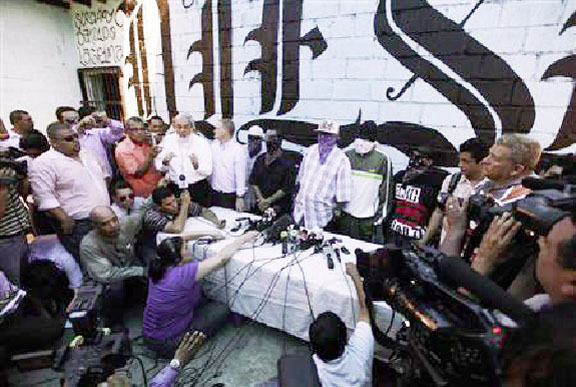TEGUCIGALPA, (Reuters) – Two of the most violent gangs in Honduras announced a truce yesterday under a church-brokered drive to stem a tide of violence that has turned Honduras into the world’s most murderous country.
Following the example of similar gangs in neighboring El Salvador, masked members of the “Calle 18” and “Mara Salvatrucha” gangs made separate announcements from within San Pedro Sula prison in northern Honduras, which houses the country’s most violent criminals.
“Today we’re agreeing to zero crimes, zero violence on the streets,” the member of the Mara Salvatrucha gang said of the nationwide ceasefire. “Both inside and outside, the boys know what we’re talking about.”
“We want change; from now on comes the positive,” he added, flanked by Romulo Emiliani, the bishop of San Pedro Sula, and Adam Blackwell, Secretary for Multidimensional Security at the Organization of American States, who brokered a similar deal in El Salvador between the two most violent gangs there.

Both gang members said they were keen to end the cycle of violence, but also demanded help from the government to find work and to be forgiven once they came out of prison.
“We’re willing to work to lower the violence, but we need everyone to be on board, because we’re not willing to be the only ones,” said the masked Calle 18 member.
Violence linked to organized crime in Honduras has sky-rocketed in recent years, partly due to the presence of Mexican drug gangs who use the Central American country as a transit point for contraband.
Honduras has the highest murder rate in the world, according to the United Nations, with 87 killings per 100,000, while San Pedro Sula, the country’s second city and industrial hub, is the world’s most murderous city.
In December 2009, the head of the government’s drug control office was shot dead by suspected cartel hitmen in the Honduran capital, Tegucigalpa, while the country’s top anti-money laundering official was murdered in April.
On Monday, Honduran President Porfirio Lobo gave his blessing to Emiliani’s efforts to broker peace between the gangs, but said the government would ensure the law is upheld if peace falters.
“The state will keep strengthening its criminal investigations in order to impose order,” he said.
Bishop Emiliani has a long history of trying to negotiate peace between the cartels in San Pedro Sula and its anarchic prison and has arranged social rehabilitation programs for former members.
“This is the beginning of something new, but it’s not the end,” he told Reuters. “This is a covenant between the gangs and Honduran society.”
Last year El Salvador’s two largest street gangs, which go by the same names as their Honduran counterparts but have independent leadership structures, signed a pioneering truce that cut the country’s murder rate by half in just four months.





